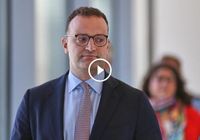In a significant political development, SPD faction leader Matthias Miersch expressed confidence in collaborating with newly elected CDU counterpart Jens Spahn in the black-red coalition. Speaking to the Funke media group on Friday, May 9, 2025, Miersch stated, "We are both professionals. Even with different positions, it is important to move the country forward." This statement underscores a commitment to progress despite their differing political ideologies.
Miersch, who aligns with the left wing of the SPD, and Spahn, a conservative Christian Democrat, were both elected to lead their respective parliamentary groups earlier this week. Their leadership marks a crucial moment in the ongoing coalition dynamics between the SPD and the CDU, particularly as they navigate the complexities of their political differences.
Spahn has recently stirred controversy by advocating for the normalization of the AfD, a stance that has drawn criticism from various political factions. His comments have raised questions about how the coalition partners will address the far-right party's influence within the Bundestag. Miersch's assurance of professionalism may serve as a foundation for managing such contentious issues.
As the new leadership duo prepares to tackle the challenges ahead, they must work to establish a functional partnership that prioritizes the welfare of the country. The SPD and CDU have historically held differing views on numerous topics, but the urgency of the current political climate necessitates a united front.
Spahn's election as the head of the Union faction follows his previous role as Germany's Health Minister, where he gained significant experience during the COVID-19 pandemic. His extensive political background spans over two decades, making him a prominent figure in the Bundestag. His recent push for a more inclusive approach towards the AfD, however, has been met with skepticism and concern.
On May 5, 2025, Spahn was elected as the new chairman of the Union faction, succeeding Friedrich Merz, who is expected to be elected as Federal Chancellor on May 6, 2025. As Spahn steps into this leadership role, the future of the coalition will hinge on how effectively he can navigate the challenges posed by the AfD's growing presence.
Spahn's controversial remarks about treating the AfD like other opposition parties have sparked a heated debate across party lines. Many view this approach as an attempt to legitimize a party that has been classified as right-wing extremist by the Federal Office for the Protection of the Constitution. The office's classification, which was confirmed on May 2, 2025, labels the AfD as a verified right-wing extremist endeavor, raising alarms about its potential influence on mainstream politics.
In light of these developments, the new coalition leaders will need to address the implications of the AfD's classification and formulate a strategy for dealing with its representatives in the Bundestag. Miersch and Spahn have acknowledged the necessity of coordinating their efforts, with Spahn stating, "There will not be a recommendation from our side to elect AfD representatives as committee chairs." This statement reflects a cautious approach to the far-right party's integration into parliamentary proceedings.
Alexander Dobrindt, the designated Federal Minister of the Interior, has also expressed doubts regarding a potential ban on the AfD, citing the high legal hurdles established by the Federal Constitutional Court. Dobrindt emphasized the need to focus on the underlying issues that have contributed to the AfD's rise rather than simply seeking to eliminate the party from the political landscape. His comments resonate with Miersch's perspective, which calls for political efforts to address the concerns of citizens rather than becoming mired in disputes.
The coalition's ability to navigate the complexities surrounding the AfD will be a litmus test for their partnership. As the SPD and CDU leaders embark on this new chapter, their focus on collaboration and shared responsibility will be critical in steering the country through its current challenges.
In summary, the political landscape in Germany is evolving as Miersch and Spahn take the reins of their respective factions. Their commitment to professionalism and cooperation will be essential as they tackle pressing issues, particularly those related to the AfD's controversial role in German politics. The coming weeks and months will reveal how effectively they can bridge their ideological divides and work towards a common goal of progress.





